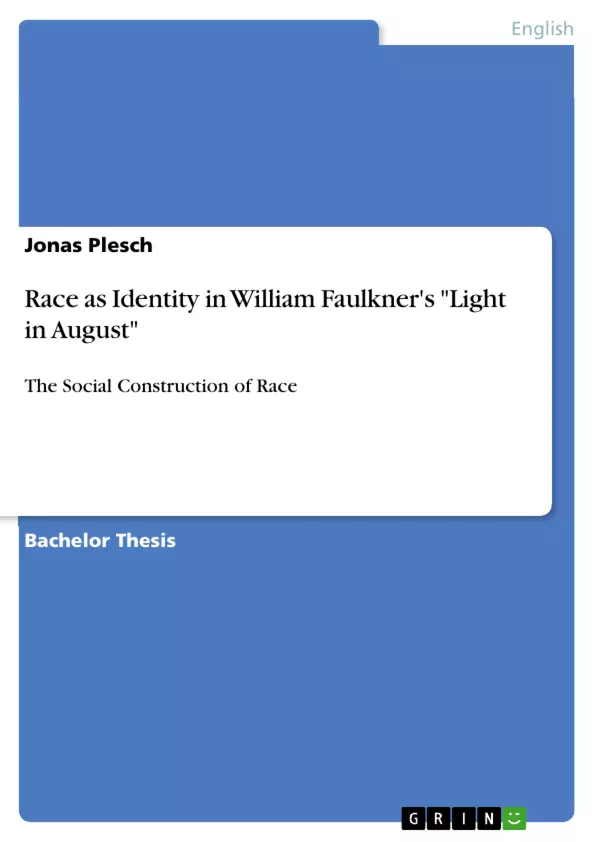This paper seeks to explore the social construction of race and how race constitutes identity in "Light in August" by means of historic background. William Faulkner is one of the most popular and influential authors of the 20th century; not without reason has he won the Nobel Prize in Literature in 1949. Setting most of his novels' plots in the fictional Yoknapatawpha County in Mississipi, he portrays life in the American South and the still lingering aftermaths of the lost Civil War, some of which are: Southern history, climate, geography, natural life, customs, traditions, ideologies, living conditions and speech patterns.
In "Light in August", race, like in many of Faulkner's works, is a basic theme. However, in "Light in August", belonging to a certain race is not only part of a person's identity; it is the central framework. Not only is race decisive of how fellow men and women encounter and treat a person but also how this person sees and perceives him- or herself. Hence, identity feeds from race. If there is no clear affiliation to a specific race, identity crisis and a constant search for self can arise as is the case with Joe Christmas in Faulkner's novel. It impacts how Christmas is approached from a very young age by those who know of his black background. Moreover, people change their behavior towards Christmas once they discover that he is partly of African-American origin. The biggest burden for Christmas, though, is how he himself cannot figure out who he is and where his place in Southern society is.
Inhaltsverzeichnis (Table of Contents)
- Introduction
- Social Construction Of Race
- Race in Faulkner's Fiction
- Central Motifs
- Faulkner's Black Characters
- Historic Background: Jim Crow Era
- Establishing Slavery
- From the Abolishment of Slavery to Racial Segregation
- In Search for a Self: Joe Christmas' Identity Crisis
- Racial Ambiguity
- Joe Christmas' Gender: Confusion and Irritation
- Conclusion
Zielsetzung und Themenschwerpunkte (Objectives and Key Themes)
This paper aims to explore the social construction of race and how race constitutes identity in William Faulkner's novel Light in August, using historical background as a framework.
- The social construction of race as a concept
- The impact of racial identity on individual self-perception
- The influence of historical context, particularly the Jim Crow Era, on racial dynamics in the novel
- The exploration of Joe Christmas' identity crisis as a result of racial ambiguity
- The interplay of race and gender in shaping Joe Christmas' character
Zusammenfassung der Kapitel (Chapter Summaries)
- Introduction: The introduction establishes the context of William Faulkner's work and its focus on racial themes in Light in August. It highlights how race shapes not only individual identity but also social interactions and perceptions.
- Social Construction Of Race: This chapter delves into the concept of race as a social construct, highlighting the works of W.E.B. Du Bois and Anthony Appiah. It examines how the division of people into races is based on societal constructions rather than biological realities.
- Race in Faulkner's Fiction: This chapter focuses on how race is portrayed in Faulkner's works, particularly in Light in August. It examines key motifs and the portrayal of black characters in Faulkner's writing.
- Historic Background: Jim Crow Era: This chapter explores the historical backdrop of the Jim Crow Era, including its racist laws and social boundaries. It examines the development of slavery and its connection to the establishment of the Jim Crow system.
- In Search for a Self: Joe Christmas' Identity Crisis: This chapter analyzes the identity crisis experienced by Joe Christmas, focusing on the interplay of race and gender. It examines the complexities of his racial ambiguity and its impact on his self-perception and behavior.
Schlüsselwörter (Keywords)
Key terms and concepts explored in this paper include: race, identity, social construction, racial ambiguity, Jim Crow, slavery, Southern literature, William Faulkner, Light in August, Joe Christmas, W.E.B. Du Bois, Anthony Appiah.
Frequently Asked Questions
What is the central theme of the analysis of "Light in August"?
The paper explores how race is a social construct and how it serves as the central framework for identity in William Faulkner's novel.
Why does Joe Christmas experience an identity crisis?
His crisis stems from racial ambiguity; because he cannot clearly affiliate with a specific race in the segregated South, he struggles to find his place in society.
How does the Jim Crow Era influence the novel's setting?
The historical background of racial segregation and the aftermath of the Civil War define the customs, ideologies, and living conditions portrayed in Yoknapatawpha County.
What is meant by the "social construction of race" in this context?
Drawing on thinkers like W.E.B. Du Bois, the paper argues that race is based on societal definitions rather than biological reality, yet it dictates how individuals are treated.
What role does gender play in Joe Christmas's identity?
The paper analyzes the interplay between race and gender, showing how both contribute to Christmas's confusion and his search for self.
Why is William Faulkner considered a significant author for these themes?
As a Nobel Prize winner, Faulkner is renowned for his deep exploration of the American South's history, traditions, and the lingering effects of slavery.
- Arbeit zitieren
- Jonas Plesch (Autor:in), 2018, Race as Identity in William Faulkner's "Light in August", München, GRIN Verlag, https://www.grin.com/document/1298028



